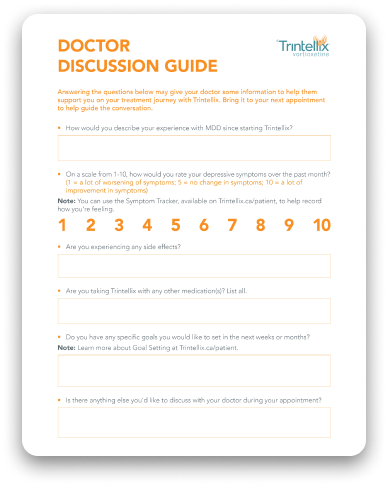

Understanding major depressive disorder (MDD)
In this section, we’ll help you understand MDD, a form of depression, what causes it and how it’s diagnosed. We’ll also debunk some myths about depression, provide some information about goal setting and give you a helpful tool to start the conversation with your doctor.


Did you know?
Over 300 million people worldwide have MDD. So, if you’re one of the people suffering, you are not alone. No one is immune to depression and it can occur at any age.

Facts about depression
What is MDD?
Major depressive disorder is a common and serious medical illness that can affect how you feel, the way you think and how you act. It can cause feelings of sadness and/or a loss of interest in activities you used to enjoy. However, it is treatable.
Depression can have many symptoms. It can affect how you feel, think and behave and can lead to a variety of emotional and physical problems. You may be suffering from depression if you are experiencing symptoms most of the day, nearly every day and may include:
- Poor appetite, overeating or considerable weight changes
- Trouble sleeping or sleeping too much
- Moving or speaking slowly, so that other people have noticed or being so restless that you've been moving around a lot
- Feeling tired or having little energy
- Feeling bad about yourself – that you are a failure or having a lot of guilt
- Difficulty thinking, concentrating on things or making decisions
- Thoughts that you would be better off dead or of hurting yourself in some way
- Feelings of sadness, tearfulness, emptiness or hopelessness
- Angry outbursts, irritability or frustration, even over small matters
- Loss of interest or pleasure in most or all normal activities, such as sex, hobbies or sports
- Unexplained physical problems, such as back pain or headaches
MDD can cause problems in day-to-day activities, such as work, school and social activities. That’s why it’s so important to make an appointment to see your doctor.

What causes depression?
Depression is believed to be caused by an imbalance of certain chemicals in the brain.
Some of the risk factors for depression include:
- A family history of depression
- A psychological or emotional predisposition
- A major life stress
Common myths about depression
You can just “snap out of it.”
Depression is a real medical condition. One of the contributing factors to depression is an imbalance of chemicals that occur naturally in the brain.
Depression isn’t that common.
Over 300 million people worldwide have MDD. You are not alone!
Men don’t suffer from depression.
While depression is more common in women, men still suffer from it. In Canada, about 11% of men and 16% of women will suffer from major depression in their lives. Depressed men typically have a high rate of feeling irritable, angry and discouraged.
Depression is a temporary change in mood, a character defect and a sign of weakness.
Depression is not any of these. It is a real medical condition and it is treatable.
I can hide my depression and no one will know.
Depression reveals itself in many aspects of a person’s life. Their feelings, moods, energy levels and ability to think can all be affected by depression.
I just have a touch of sadness, I am not really depressed.
It is common for people to underestimate what they are going through. Your doctor can help with some simple assessments and insights. It is always better to seek help from a professional than trying to tough it out on your own.
Depression only affects mood.
Depression can affect how you feel, think and behave. People with depression do not all experience the same symptoms, and the severity, frequency and duration can vary. Talk to your doctor about all of your symptoms.
I should stop taking my medication if I start to feel better.
This is a common misconception. Your doctor is a trained medical professional. There was a reason your doctor prescribed medication for you. Continue to take your medication until your doctor tells you to stop.

Goal setting
One way to stay motivated on your mental health journey is to set goals. Start with small, simple goals; when you’re feeling more confident, work toward larger, more long-term goals. Make sure to write your goals down and develop a plan for how you’ll achieve them.
Using the S.M.A.R.T. approach to goal setting can help.
Try to set goals that are:
- Specific – Try to answer Who? What? Where? And Why? when you think about your goal
- Measurable – Your progress toward your goal should be easily trackable
- Achievable – Challenging is great; unreachable isn’t
- Relevant – Make sure your goal feels worthwhile
- Time-based – Set a time limit to keep yourself motivated
Don’t forget to enlist your support network as you set your goals. You may find it helpful to have someone keep you accountable and check in on you.

Doctor Discussion Guide
Doctor Discussion Guide
Our Doctor Discussion Guide can help you start the conversation with your doctor.
* Not available in Quebec.
You are now leaving trintellix.ca
You are now leaving the trintellix.ca website. You have selected a link that will take you to a site maintained by a third party who is solely responsible for its contents.
The Company is not responsible for the Privacy Policy of any third-party websites. The Company encourages you to read the Privacy Policy of every website you visit.
Click “Cancel” to return to the trintellix.ca website or “Continue” to proceed.
